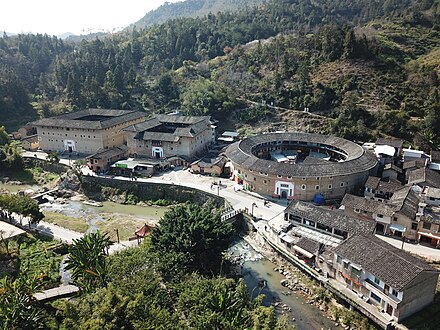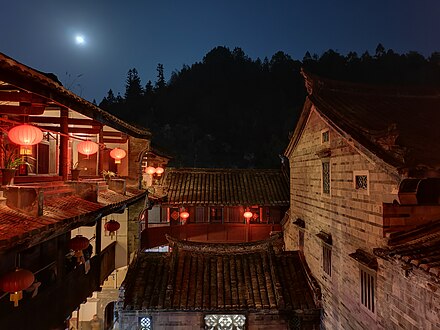Longyan - prefecture-level city in Fujian, China
 Longyan (dead link: January 2023) (龙岩; Lóngyán) is a city in Fujian Province in China.
Longyan (dead link: January 2023) (龙岩; Lóngyán) is a city in Fujian Province in China.
Understand
 Longyan is a small city by Chinese standards (about 2.5 million) in Fujian. Most visitors end up here passing through to see the Hakka earth houses in Yongding County. Tourist infrastructure is minimal, and there are no large tour buses. An afternoon in Longyan can provide a glimpse of life in a growing, non-coastal city. Do not expect any English to be spoken.
Longyan is a small city by Chinese standards (about 2.5 million) in Fujian. Most visitors end up here passing through to see the Hakka earth houses in Yongding County. Tourist infrastructure is minimal, and there are no large tour buses. An afternoon in Longyan can provide a glimpse of life in a growing, non-coastal city. Do not expect any English to be spoken.
The prefecture consists of: Xinluo District 新罗区, Yongding District 永定区 , Zhangping City 漳平市, Changting County 长汀县, Shanghang County 上杭县, Wuping County 武平县, and Liancheng County 连城县.
Get in
By plane
- Longyan Guanzhishan Airport (龙岩冠豸山机场), 288 Lianhang Road, Liancheng County (连城县莲航路288号) (Buses are available to convey passengers to and from the city. The bus fare is ¥30.), 25.6750823197°, 116.7466724880°, +86 597 8918820, +86 597 8918825, zhangq@iport.com.cn. Flights are available from Beijing, Chengdu, Foshan, Guilin, Kunming, Nanjing and Shanghai. 2019-02-03
By train
Longyan has rail connections to:
- Shenzhen
- Fuzhou
- Ganzhou takes 4½ hours, train number N520.
- Shanghai (via Guangzhou or Xiamen, 9 hours)
There is a newly-constructed train station where tickets can also be bought. There is no ATM in the station and they do not accept foreign credit cards.
By bus
Longyan is well connected and most cities in Fujian including Xiamen and Fuzhou can be reached from here. The bus station is on Ren Min Dong Road and tickets can be brought at the adjoining ticket office. From Xiamen, there are numerous buses that depart in the early afternoon, however the last return bus departs at 12:30. Buses can drop passengers off at villages or tulous along the way.
The train and bus stations are about 1 km apart.
Get around
While there are occasional taxis and motorbikes, they're very irregular. There is a taxi stand at the train station. As everywhere in China, you can use the Didi app (Chinese Uber) to call taxis on the spot. A ride within the city center costs around ¥10.
Additionally, there is an excellent public bus system that connects all around the city (fare ¥1, cash accepted, no change given). Any lodging should also be able to arrange a taxi to visit the surrounding villages.
Talk
Minnan is the main language spoken in eastern urban areas, while Hakka is the main language in the western rural areas. That said, most younger speakers of those languages are able to speak Mandarin as well. There are very few English speakers.
See
 The best-known tourist attraction in the area are the Fujian Tulou earth houses (土楼 tǔlóu), often round, of the Hakka people (客家人; kèjiārén). These houses are on to the UNESCO World Heritage List.
The best-known tourist attraction in the area are the Fujian Tulou earth houses (土楼 tǔlóu), often round, of the Hakka people (客家人; kèjiārén). These houses are on to the UNESCO World Heritage List.
Hakka means "guest"; they arrived in the area (western Fujian and Eastern Guangdong) as refugees from one of Northern China's wars several hundred years ago and still have their own dialect and customs. These houses are quite large, holding an extended family, and built to be easily defended. There are none in the city itself, but there are thousands in villages to the West. Hotels can arrange a car or van to visit these places (¥200-300/day).
Other sights
- Mount Guanzhi National Geopark (冠豸山国家地质公园, Guangzhishan National Geological Park), Liancheng County (连城县) (Take a long-distance bus to Liancheng County. Upon arrival at the Liancheng County Bus Station, you can either catch a taxi or take bus no. 6, which stops within 800 metres of the park entrance. The park entrance is about 2.5 km from the bus station and about 5.5 km from Longyan Guangzhishan Airport.), 25.7138370204°, 116.7814551756°, +86 597 3128080. 08ː00-17ː30 (May to October), 08ː30-17ː00 (November to April). Longyan's most popular scenic attraction. The two main sights within the park are Mount Guanzhi (冠豸山) and Shimen Lake (石门湖). ¥115 (¥99 if purchased online) 2019-02-03
- Longyan Museum (龙岩市博物馆), No. 2 People's Square, Longyan Avenue, Xinluo District (新罗区龙岩大道人民广场中2号) (Bus nos. 1, 3, 9, 16, 20 and 30), 25.075124°, 117.013736°, +86 597 3308908, lysbwg@163.com. 08:30-11:30, 15:00-17:30 (summer), 08:30-11:30, 14:30-17:00 (winter), closed on Mondays. Free 2020-04-26
Do
- Tianzi Hot Spring Resort (天子温泉), 4 Jiantan Group, Dongxi Village, Chengjiao Township, Yongding District (永定区城郊乡东溪村箭滩组4号) (Take bus no. 2 from the Yongding Bus Station.), 24.7506°, 116.7592°, +86 597 3350888. 08ː30-23ː00. Tianzi Hot Spring Resort is a resort with 4/5-star hotel and 90 different style hot spring pools. ¥238 2019-01-30
Culture
There are a large number of beautiful Hakka villages in the area that are worth exploring. There's a particularly large grouping of tulou in the village of Hukeng, to the south-west of Longyan. Entrance fee is ¥90 for Hukeng (called the Earth House Culture Village), and for an additional ¥10 you can add the neighboring tulou cluster of Gao Bei Tu Lou (高北土楼). Hukeng offers a quiet and sincere glimpse of tulou life, while Gao Bei is more geared to tourists and shopping. There are several restaurants in Hukeng catering to tourists, and prices can be higher (¥90-120/meal). Many restaurants offer homemade rice wine. Hotel accommodations surrounding Hukeng and Gao Bei are also plentiful. As in Longyan, don't expect any English to be spoken.
Amusement
There is an amusement park called Zhigao Amusement Park (志高游乐园) in the west part of town. It features rollercoasters and Disneyland-like architecture. Opening times: 15:00-22:30 (workdays), 9:30-22:30 (weekends and holidays). Admission: ¥120 for adults, ¥50 for children.
Buy
Longyan's city center in itself is small, but has many places where designer brand and mobile phones etc. can be bought.
There is a walking street area (中山路步行街 Zhongshanlu Buxingjie) at Zhongshan Street (中山路), north of the river and next to Zhongshan Park (中山公园 Zhongshan Gongyuan), with many shops and food stalls that are open till late in the evening.
There is also the wholesale district of Jiaoyi Cheng which sells everything from shoes and tea to electronics at wholesale prices. As of June 2018, many massive furniture and home appliance outlets have opened in the area. Jiaoyi Cheng can be reached by catching the No.10, No.12 and No.19 buses. There is also a several-building clothing market in the Jaioyi area called Bai Ma (白吗). Go early— shops tend to close by 16:00, though many on the street level stay open later.
Eat
There are casual food stalls and eateries all around the city, serving a variety of regional cuisines but especially focused on Hakka cooking. A large number can be found at the walking street mentioned in the Buy section above.
There are also country-restaurants where you can select whichever meats and vegetables look good and they'll stir-fry them in a large amount of oil. Expect to pay around ¥20/meal.
Drink
There is a number of tea farms in the area, and Fujian is well known for its Oolong tea, and to a lesser extent its Iron Guanyin Tea (铁观音茶) . Fujian has what might be called a tea-ceremony, where water is poured into a pot full of tea leaves, immediately poured into another pot, and then poured into thimble-sized tea glasses. It's likely any restaurants, lodging, or private residence you enter, will offer you this style of tea. The tea itself varies wildly in both quality and price.
Additionally, many private residences will have a large jug of baijiu, with Chinese medicinals steeped inside.
Most soft drinks and especially beer will be served room-temperature.
Sleep
There are hotels in Longyan and the nearby city of Yongding. There is a number of cheap hotels just opposite the train station, any of the buildings with red or blue signs on top. Price ¥40-60 for a double.
 Many tulou offer accommodation to tourists, ranging from very simple (plain rooms, no bathroom) to beautifully decorated rooms with airconditioning and private bathrooms. See Fujian Tulou for detailed information.
Many tulou offer accommodation to tourists, ranging from very simple (plain rooms, no bathroom) to beautifully decorated rooms with airconditioning and private bathrooms. See Fujian Tulou for detailed information.
Go next
- Fujian Tulou in Yongding County and Nanjing County, just south-east of Longyan, are amazing earth structures where a number of residences are built inside a single fortified compound.
- Xiamen
- Wuyi Mountain
- Guangdong
Longyan
longyan.gov.cnLongyan Shi
2nd-order administrative division
Fujian
Primary administrative division